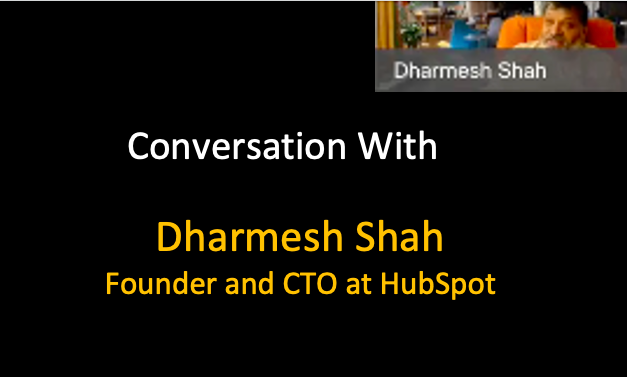Seed Capital
Roundtable Recap: July 8 – Building HubSpot to a Unicorn: Dharmesh Shah’s Amazing Entrepreneurial Journey

During this week’s roundtable, we had as our guest Dharmesh Shah, Founder and CTO of HubSpot. Dharmesh discussed his entrepreneurial journey with candor, humility and generosity. Wonderful conversation.
You can listen to the recording of this roundtable here:
1Mby1M Virtual Accelerator Investor Forum: With Jon Staenberg, Managing Partner at Staenberg Venture Partners (Part 3)
Sramana Mitra: What are those areas of personal interest to you currently?
Jon Staenberg: Gaming is one of these massive categories. If you are not in it or if you are not a participant, then you don’t know how large and exciting it is. My generation doesn’t get that this is changing the world in so many ways.
I invested in a company called Manticore. It’s a Stanford guy that I got to know. I saw his passion. I got to know him over time. I had no idea about the gaming industry, because I am not a gamer. I love sports. I am a ticket stub collector and the whole NFT thing is interesting to me.
>>>1Mby1M Virtual Accelerator Investor Forum: With Jon Staenberg, Managing Partner at Staenberg Venture Partners (Part 2)
Sramana Mitra: What is your current strategy going forward? Humanity has never changed in such space as you pointed out earlier. As we are seeing everywhere in all dimensions of life, this has been a real change enforcer. How do you parse that and what is your investment thesis going forward? What are you looking to invest in and what would be the strategy?
Jon Staenberg: I was extremely active during the last year personally as an angel. I also have changed my own personal strategy around a few ways to invest. What do I mean by that? I have said this for a while now. At the highest level, it used to be the case that technology was rolling out in a serial linear fashion.
>>>1Mby1M Virtual Accelerator Investor Forum: With Jon Staenberg, Managing Partner at Staenberg Venture Partners 2021 (Part 1)

Jon Staenberg, Managing Partner at Staenberg Venture Partners, discusses the trends he is seeing and the investment thesis he is following.
Sramana Mitra: How have you been? How has COVID been? Has everything been okay?
Jon Staenberg: I was just talking about that this morning. I feel very lucky. I traveled a lot during COVID. I got a lot of business done. I have to say that I feel very fortunate. Now, it seems like airports are busy. People are traveling and they are eager to get out. In fact, I hold investor and founder dinners in San Francisco and Seattle. I get a lot of unsolicited reminders that we should get going with those.
>>>1Mby1M Virtual Accelerator Investor Forum: With Shane Neman, Principal at Neman Ventures (Part 7)
Sramana Mitra: Have you met any entrepreneur who is trying to merge the world of art collecting and blockchain?
Shane Neman: I haven’t met them, but I have seen some decks.
Sramana Mitra: If you locate them, can you send them to me? I have a concept that merges those two. I am looking for an entrepreneur team to execute on that.
>>>1Mby1M Virtual Accelerator Investor Forum: With Shane Neman, Principal at Neman Ventures (Part 6)
Sramana Mitra: You were running a bootstrapped business; you had to make it profitable, otherwise you would go out of business.
Shane Neman: Right. It is interesting because there were certain things that I could have done to accelerate a lot. However, I chose not to do it because it would be highly unprofitable to do. I think that venture-backed companies have the luxury of doing that because they have runway and burn and all this money behind them. I didn’t have that. I don’t think that is normal in the SaaS world. I was in it in the early stages.
>>>1Mby1M Virtual Accelerator Investor Forum: With Shane Neman, Principal at Neman Ventures (Part 5)
Sramana Mitra: Did they come to you or did you approach them? How did you find that exit?
Shane Neman: We were friendly, but we were fierce competitors. I approached him and said, “Listen, something’s got to give, I would be willing to discuss selling the company if that was something that you were interested in. That way, we can get rid of this competition where we are driving prices up.” We came to terms that made sense for both of us.
Sramana Mitra: What level of an exit was it?
>>>1Mby1M Virtual Accelerator Investor Forum: With Shane Neman, Principal at Neman Ventures (Part 4)
Sramana Mitra: You also did ad sales on your own?
Shane Neman: Initially, I did. The first advertiser I got was a boutique that was doing a sample sale. They asked me how much I wanted to send out an email blast. I said $5,000. I just made up a number. It was whatever I thought was really expensive at that time. They just said, “Okay, come pick up the check, and we will give it to you. We will send it next week.”
>>>